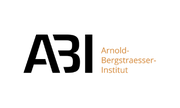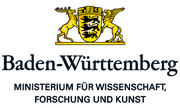- Info
ACT in Video
"Restitution is not just about objects"
In this contribution, Richard Tsogang Fossi does not simply recount the history of looting and plundering in the former German protectorate of Cameroon, but builds a bridge to the here and now. The far-reaching effects of the monetary policy implemented in the colonies at the end of the 19th century become particularly clear here and that restitution is about much more than mere objects.
"Mortui Vivos Docent"
This video was produced in connection with the DZK-funded project on reciprocal research into the Alexander Ecker Collection. Albert Gouaffo's speech on the occasion of the presentation of policy recommendations to the Ministry of Science, Research and the Arts (Baden-Württemberg) and to the Rector of the University of Freiburg was held in the anatomy room of the FRIAS, above the entrance door of which are the words “Mortui vivos docent” (the dead teach the living) - a motto that continues to inspire reflection on colonial violence and the collection of “human remains”.
"Impressions of the SDG University Day 2023 in Freiburg"
A Commentary compiled by students of the University of Freiburg and the University of Ghana
"SDG 17: Decolonizing Partnerships" was the topic of the Sustainable Development Goals (SDG) University Day Baden-Württemberg on the 16th of June 2023 at the University of Freiburg. It was hosted by the Africa Center for Transregional Research (ACT) in cooperation with the Arnold-Bergstraesser-Institute Freiburg.
In this video, four ASA students share their perspectives on the SDG University Day 2023 and take us along with them to their workshop on "Decolonizing the Curriculum?". Follow them through the event and hear some voices from the discussions.
"The Dead are not in a Rush"
Communicating science - this video attempts to artistically process research results from the project "Provenance Research with a Restitution Perspective".
This experiment in science communication is based on a 1.5-hour conversation between Prof. Wazi Apoh (University of Ghana) and Prof. Andreas Mehler (University of Freiburg). The text reflects the statements of the two experts in the form of film images and contains audiovisual excerpts from the discussions of the advisory board as well as material filmed with Prof. Albert Gouaffo (University of Dschang) at the Institute of Biological Anthropology at the University of Freiburg.
The voices of the two professors were re-enacted by two actors (Thomas Douglas for Andreas Mehler and Mbene Mbunga Mwambene for Wazi Apoh) and show some of the unexpected results of the research process in the exchange with the international advisory board.
"VAD 2022 Conundrum"
Impressions of the VAD conference 2022.
Produced by students of the University of Freiburg.
Under the title "Africa-Europe: Reciprocal Perspectives" the conference of the Association for African Studies in Germany (VAD e.V.) took place from 7-10 June 2022. It was hosted by the Africa Centre for Transregional Research (ACT) at the University of Freiburg.
For further information, please visit the conference website.
"VAD 2022 Kaleidoscope"
Under the title "Africa-Europe: Reciprocal Perspectives" the conference of the Association for African Studies in Germany (VAD e.V.) took place from 7-10 June 2022. It was hosted by the Africa Centre for Transregional Research (ACT) at the University of Freiburg.
For further information, please visit the conference website.
"Gender inequalities"
(June 2022)
Prof. Charlotte Wrigley-Asante, Associate Professor, University of Ghana
Charlotte Wrigley-Asante is Associate Professor at the University of Ghana and head of the Department of Geography and Resource Development. Her research focuses on the topics Gender, Poverty and Empowerment Issues; Gender and Cross Border Trading; Gender and Migration as well as Gender and Energy Issues.
Website
Restitute Objects - Ancestors Return
(April 2022)
For 'For Restitute Objects - Ancestors Return', Felwine Sarr and Bénédicte Savoy entered into dialogue with the next generation. The task given to them was to narrate what they lived through on their journey to Benin on 9 and 10 November 2021 accompanying the restitution of the 'treasure of Abomey'.
French art historian Bénédicte Savoy meets 12-year-old Maja from Zurich in the Kunsthaus of the girl's hometown, and in the warehouse of the Museum der Kulturen Basel, Felwine Sarr meets 11-year-old Yanis who lives next to this Museum accommodating one of the biggest collections of ethnografica in Europe.
'Restitute Objects - Ancestors Return' was written and directed by Balz Andrea Alter based on the research of Felwine Sarr and Bénédicte Savoy.
The ETHZ film project was realized in collaboration with the ACT (University of Freiburg) and with support of the CASB (University of Basel).
"Restitution? - Towards a new paradigm"
(April 2022)
Prof. Albert Gouaffo - Université de Dschang, Cameroon
Albert Gouaffo is Full Professor of German literature and culture studies as well as intercultural communication at the University of Dschang, Cameroon
He figures as a member of advisory board of the ACT Reciprocal Provenance Research on the Alexander Ecker Collection. Currently, he’s working on « Mapping Cameroonian cultural goods in Germany » together with Bénédicte Savoy in the framework of the research project « Umgekehrte Sammlungsgeschichte » of the TU in Berlin. The aim of this research project is to find out where Cameroonian objects that are in German museums came from and what they have been used for over the past hundred years. The Cameroonian part of the team focuses on questions such as: What memories of the objects still exist locally? What forms of resistance there were against their transfer to the empire? And whether their return was demanded or not and why?
"The Zimbabwean migration crisis is the biggest policy opportunity in South Africa"
(March 2021)
Dr. Khangelani Moyo, Independent Researcher, Johannesburg, South Africa
Khangelani Moyo has academic training in migration studies, urban studies, sociology and social anthropology. He completed his PhD at Wits university in 2017, focusing on migrant mobilities in urban spaces and how their spatial identities are negotiated in the city of Johannesburg. His research interests include migration management, refugee governance, migrant transnationalism, spatial identity in the city and social vulnerabilities in the urban periphery. He is also an associate of the Arnold-Bergstraesser-Institute in Freiburg where he collaborates on a research project on the political stakes of refugee governance in African.
"Lowering asymmetries in knowledge production"
(March 2021)
Prof. Dr. Andreas Mehler, Director of ACT, Freiburg, Germany
Andreas Mehler is director of the Africa Centre for Transregional Research (ACT) at the University of Freiburg. He is director of the Arnold Bergstraesser Institute (ABI) and Professor of Political Science at Freiburg University since October 2015 after having served as director of the GIGA Institute of African Affairs in Hamburg (2002-2015). He is the President of the Executive Council of the Maria Sibylla Merian Institute for Advanced Studies in Africa (MIASA).
Website





